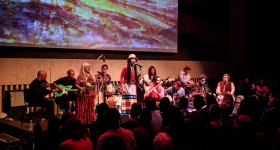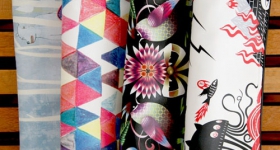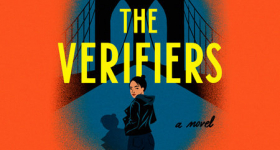The Party for Justice will feature many amazing Asian artists and performers. One of the headliners is Magnetic North & Taiyo Na, which is comprised of Theresa Vu, Derek Kan, Taiyo Na and producer Chucky Kim. A hip-hop powerhouse, Magnetic North & Taiyo Na have risen to the #2 spot of Japan’s hip-hop charts with their title track followed by a full-album release overseas backed by label Goon Trax, in addition to a number of charted singles. They’ve also collaborated with a great collection of artists including Jin, Vienna Teng, Robert de Boron, re:plus, DJ Chika, Sam Kang and Wong Fu Productions, who produced their AAIFF award-winning music video, “Drift Away," as well as their hit song, "Home:Word," which has over 1 million views on YouTube.
Hyphen had the privilege of speaking with the group about their work and their plans for the future.
How did you all get involved in the upcoming AACRE benefit? What compelled you to perform?
Derek: Tracy reached out to me and told us about the event and asked us about our availability. Of course, I talked to Chucky, Taiyo and Theresa and knew it was a great event for a good cause. In general, we don’t go out to the San Francisco Bay Area since we’re on the East Coast but we thought this would be a great event to go out and do and really wanted to support AACRE.
Theresa: We’re almost always open to events that support Asian progress.
I know that initially, Derek and Theresa started out as a separate group from Taiyo and Chucky. What spurred your partnership on the Home:Word album?
Theresa: It wasn’t planned, which I think was part of the magic of it. We just started jam session-ing together and we all seemed to be on the same vibe musically, which is pretty rare if you’ve ever created music with somebody. Magically we were all in the same space. We had so much fun jamming. There was this one weekend where a friend of ours invited us to a cabin in Vermont and we came up with a lot of the skeleton for the album within three days.
There was a really good balance in the group so it kind of came very organically and after one of these jam sessions, we decided we wanted to throw a charity concert. And our band all happened to be coming to the Bay Area at the same time so it made the charity concert we wanted to throw much more of a reality, and then when we finally jammed together on these songs we’d been working on, it really cemented that we had something here that was hitting a very strong sentimental note in all of us, too. And that’s how Home:Word was born. It was kind of like that clichéd lightning in a bottle.
What do you hope listeners take away from this album?
Taiyo: I think just like Chucky and Theresa were mentioning, we met each other at the intersection of all these community events. And then we connected with Chucky through a progressive, creative and tech community organization and also a kind of hub for community youth activism in Boston. I think our music became a reflection of the community itself.
All these things from Asian American community groups and Asian American movement history and all this stuff became the ingredients to a pot that we were cooking. We were all on a community vibe trying to reflect music that reflects our community.
Is social justice the motivation for your music?
Derek: It’s definitely a huge part of it but I don’t think it’s all of it. A lot of the songs on the Home:Word album are just about our personal lives and what its like to move cross-country or to feel alienated in your own workplace or with a certain group of people or in this country. And there’s also some feel-good vibes about love and family. But it’s all very personal to us and how we reflect on our lives. A lot of times when people write music they just want to write about their experiences. We don’t ever want to write about others’ experiences. We want to write how we feel and stay true to our message.
I know you have all made a serious mark on the Asian markets. Can you speak some to how you feel the markets there vary from the U.S. market?
Chucky: With Home:Word specifically, the reception of it was really interesting because I remember it did well in Japan and was also around the time when Fukushima happened, and there was this interesting openness to whatever the sound of Home:Word was — call it communal, call it organic. Whatever feelings that arose from it, the album was something that was received well.
I heard from friends in public spaces in Korea or Japan. From a technical, music theory standpoint, it’s an interesting thing because the chord progression is pretty much like Pachelbel’s Canon in D. It’s a familiar tone and sentiment. It was a really cool experience for me as an Asian American/Korean American, as someone who grew up stateside, to have people in Asia connect on a very similar wavelength.
In terms of the market, right now is a really beautiful moment to see. I’ve worked in a lot of youth art centers and seeing the youth now — all of them are kids of color — and they’re choreographing dances to K-pop, which is amazing. There was a world music class I was in one day and the teacher was talking about “Gangnam Style,” and all of these brown and black kids were correcting his pronunciation and my mind was being blown because now you have this open and global reception of music coming out of Asia and there’s a lot more collaboration happening.
It’s always kind of been the case, but since the ’90s Asian American producers and songwriters have, in a lot of ways, been considered second class, especially in Korea. But now you really have this time when a lot of Korean companies are hitting people up — a lot of my friends, and even me — and they kind of want that brand and flavor of Asian American voices and sounds that have, essentially, grown up in a different context. It’s really cool and interesting how much it’s shifted since I was growing up.
Given the current political environment, music from Asian American voices is so important. What kind of feedback have you gotten from your fans, given the lyrics you guys have in your work?
Theresa: I think a lot of the feedback is around gratefulness. It’s really lovely. Some people crave the representation of having songs and lyrics and words that speak for an experience you don’t normally get with other music.
Some of what really touches me is when you perform for community spaces and then you have people who have put so much energy and work into their community and they really thank you for music that is recharging them. It’s amazing to be thanked for putting music to their experience.
I’ve also gotten feedback from people who are like, “Can’t you make something more fun? I don’t want to hear this shit!”
It may not be the widest demographic, but I think it’s meaningful to try to speak for an experience that doesn’t get that much air.
Derek: Between 2015-2016, we didn’t really write much at the time, and there was a downtime in which we were kind of focused on our 9 to 5 jobs but still kind of writing for our label in Japan.
But we were writing this song and it kind of fell off and then the election happened and so many things have been changing in the last few years, and we just decided that now is the time to finish this song. We even started this song before Trump but now it just felt like we had that last bit of motivation to fine-tune it, complete it and get it to our listeners and the world. A resurgence for us to write material and put more out in the near future.
What are your goals and plans for the future? Are you planning to continue to collaborate?
Taiyo: Next year is our 10-year anniversary of the album Home:Word, so we’ve got a number of projects we want to do. Then we’ve got a lot of work ahead, but we want to re-release the album in vinyl. We love the sound and have some unreleased recordings, and a lot of fans have been asking for sheet music and chords for many years.
Theresa: There is some stuff cooking, but I feel kind of shy about showing our hand. But I think for us, the group we have, the vibe is still quite strong and there’s always new stuff that will come out from here.
Any thoughts on your inspiration and what kinds of artists you are motivated by?
Taiyo: You can be in your late 30s and still make music!
Derek: 40 is the new 30!
Theresa: I wanted to give a shout-out to Hyphen. I was a subscriber back when it was a printed copy and for sure, it was just important to have such a nice, glossy, cool publication for Asians. I think this interview and call just kind of feels like a homecoming, being interviewed by the publication. I still have my issues hidden somewhere.










Comments